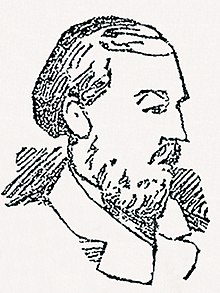
Back William Bury Spanish William Henry Bury French Бери, Уильям Генри Russian William Henry Bury Vietnamese
William Henry Bury | |
|---|---|
 Sketch of Bury from The Dundee Courier, 12 February 1889. He had dark hair and a beard, was 5 feet 3+1⁄2 inches (1.613 m) tall, and weighed less than 10 stone (64 kg).[1] | |
| Born | 25 May 1859 Stourbridge, Worcestershire, England |
| Died | 24 April 1889 (aged 29) Dundee, Scotland |
| Cause of death | Execution by hanging |
| Occupation | Sawdust merchant |
| Spouse |
Ellen Elliot
(m. 1888; died 1889) |
| Parent(s) | Henry and Mary Bury |
| Conviction(s) | Murder of Ellen Bury |
| Criminal penalty | Death by hanging |
William Henry Bury (25 May 1859 – 24 April 1889) was suspected of being the notorious serial killer "Jack the Ripper". He was hanged for the murder of his wife Ellen in 1889, and was the last person executed in Dundee, Scotland.
Bury was orphaned at an early age and was educated at a charitable school in the English Midlands. After a few years in regular employment, he fell into financial difficulty, was dismissed for theft, and became a street peddler. In 1887 he moved to London, where he married Ellen Elliot, who was probably a prostitute. During their stormy marriage, which lasted just over a year, they faced increasing financial hardship. In January 1889, they moved to Dundee. The following month, Bury strangled his wife with a rope, stabbed her dead body with a penknife, and hid the corpse in a box in their room. A few days later, he presented himself to the local police and was arrested for her murder. Tried and convicted, he was sentenced to death by hanging. Shortly before his execution, he confessed to the crime. Although Bury's guilt was not in doubt, Dundee had a history of opposition to the death penalty and The Dundee Courier printed an editorial the day after his execution decrying the "judicial butcheries" of capital punishment.
Bury killed his wife shortly after the height of the London Whitechapel murders, which were attributed to the unidentified serial killer "Jack the Ripper". Bury's previous abode near Whitechapel and similarities between the Ripper's crimes and Bury's led the press, as well as executioner James Berry, to suggest that Bury was the Ripper. Bury protested his innocence in the Ripper crimes, and the police discounted him as a suspect. Later authors have built on the earlier accusations, but the idea that Bury was the Ripper is not widely accepted.
- ^ Macpherson, p. 19
© MMXXIII Rich X Search. We shall prevail. All rights reserved. Rich X Search